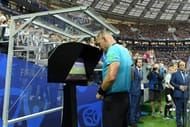There were many factors that made the 2018 World Cup a standout, but none had a bigger impact than the implementation of Video Assistant Refereeing, or VAR, for making crucial decisions during this tournament.
This competition was seen as a testing ground for the new innovation, just as goal-line technology was first implemented in Brazil four years ago. However, while the former was seamlessly integrated into the sport shortly after the tournament, VAR's journey has been considerably more turbulent.
It would be impossible to provide a definitive answer as to whether or not this new technology is better or not for the game, but, having witnessed it's effect on 64 matches, we can now make a more informed judgement on its merits - which ultimately constitutes a success in terms of what this World Cup was trying to achieve.

Through this tournament, football as a whole has developed a better understanding of the benefits and drawbacks of VAR. By running it through a number of major, controversial situations with the entire world watching, the World Cup has managed to demonstrate the conditions under which this technology may succeed, and identify the areas where it may fail.
In a sense, VAR works best with decisions where there is very little subjectivity and room for interpretation. The offside decision regarding Iago Aspas' last-minute goal against Morocco, for example, was correctly overturned as the referee was clearly able to see the position of the Spanish striker relative to the opposing defenders.
On the other hand, VAR was unable to clear the air when it came to decisions which hinged upon the personal interpretation of the referee. The penalty awarded to France for an Ivan Perisic handball remains controversial despite the use of the technology, which seemed to make it no easier for the referee to make his decision.
However, VAR was never meant to replace the role of a referees intuition and interpretation - it is simply meant to give them the opportunity to execute it with more confidence. The supposed "inability" of referees to stick to their decisions in the face of pressure from technology is not a fault of VAR; rather, it is a flaw in the way referees are told to approach it.

Other problems with VAR include the waiting time which prolongs key flashpoints and incidents, creating lengthy stoppages that disrupt the flow of the game; the feeling of "pressure" on match officials to overturn their decision having reviewed the video; and lastly, the uncertain definition of what constitutes a "clear and obvious" incorrect decision, a guideline which was hardly followed if at all during this world cup.
Ultimately, the debate surrounding VAR isn't likely to go away. While the World Cup may not have been able to prove decisively if the technology holds a net benefit for football, it succeeded in turning previously ambiguous notions into a clear set of advantages and disadvantages of this new technological innovation and has managed to rationalize much of the debate surrounding its interpretation.
In other words, whether or not we agree with VAR is secondary to the fact that the World Cup succeeded in making us more informed about its benefits and drawbacks.
Whether or not VAR takes off in world football remains to be seen, but whatever the decision may be, its implementation in the World Cup is a step in the right direction.
